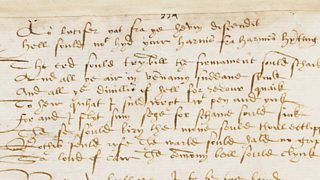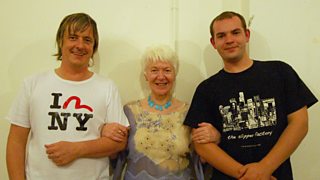The 16th Century 'rap battle' that earned a place in history
A 500-year-old Scottish manuscript contains the earliest written record of the f-word.
Uttering the f-word can be controversial. Whether it is used as a noun, a verb or an exclamation it has the power to grossly offend or easily amuse. And as Scotland – Contains Strong Language reveals, it has been in our vocabulary for centuries.


The earliest surviving record of the word is a 16th Century manuscript held in the National Library of Scotland. The document, The Flyting of Dunbar and Kennedie, is a poem which takes the form of a ribald exchange between two Scots writers, William Dunbar and Walter Kennedy.
The term flyting may now be confined to the history books, but the act of flyting shares similarities with a very modern event: the rap battle.
In this flyte, as with a rap battle, Dunbar and Kennedy exchange creative insults; they brag about their own poetic abilities while belittling the other man. Ultimately, it is taken in good spirit, but the flyting is harsh.
Kennedy variously describes Dunbar as a “fantastik fule”, an “ignorant elf” and a “wan f***it funling”. That final insult, in which Dunbar is accused of being poorly conceived by his parents, is historically important because it is the earliest surviving record of the f-word anywhere in the world.
So as surprising as it may seem, there's nothing new about the f-word. But you still may not want to use it in front of your mum.
-
![]()
Scotland - Contains Strong Language
Actor Cora Bissett discovers the hilarious history of Caledonian cursing.
Latest features from ÃÛÑ¿´«Ã½ Scotland
-
![]()
'Wild swimming helps me process the grief of losing my son'
The benefits of cold water therapy.
-
![]()
Winter adventures are appealing, but an expert advises caution
Trips in winter require particular knowledge and skills.
-
![]()
The rescuers: Why volunteers risk their lives in mountain emergencies
Landward meets members of the Cairngorm Mountain Rescue Team.
-
![]()
‘Look for the light’ – practical tips to help you through another winter with SAD
Useful advice and tips to combat low moods at this time of year.
-
![]()
How you could be a binge drinker without even knowing
Binge drinking is classed as fewer units than many people may realise.
-
![]()
How chocolate biscuits and drama classes helped one man leave prison behind
The healing power of creativity.
-
![]()
'When people believe in you, it’s life-changing'
Author Graeme Armstrong revisits the man who helped turn his life around.
-
![]()
The 'breath-taking' display of US birds swept on to British soil
Recent storms have brought rare birds to our shores.
-
![]()
Six things we learned about Alan Cumming on Take the Floor (Spoiler: includes accordions)
The actor spoke to Take the Floor's Gary Innes.
-
![]()
How street gangs trap young men in a dangerous cycle of violence
The almost inescapable pull of life in a gang.
-
![]()
Why stylist Gok Wan believes there's no such thing as bad fashion
The fashion expert says we should stop following rules and do what feels right.
-
![]()
Is sending a CV still the right way to apply for a job?
They've been central to job applications for years, but are they worth it?
















